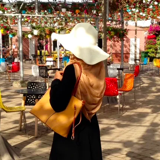“Truly, when it was said to them, ‘There is no god but God,’ they were ever arrogant.” [37: 35]
Most people don’t really reject faith and belief. Deep down everyone has questions and everyone has inclinations towards believing in something. But what they might reject is law, ‘organised religion’ as they say and following a way that could potentially end some of their habits, their idea of fun or familiarity, etc. Their fear of losing out stops them. Hence why there’s an emerging trend of people who reject religion but take up ‘spirituality’. For the elite however, it was always sheer arrogance and disdain for following a way not concocted or governed by them that often stopped them from believing.
In the famous narration of Abu Sufyan (before his faith) when he met the Roman leader Heraclius who asked him about the Prophet (sallallahu `alayhi wa sallam), we learn that Heraclius tried to ascertain the validity of the Messenger by looking for clues on the arrogance vs. humility of his followers – because it was well known that a truthful message attracted sincere and humble hearts.
Abu Sufyan said, “Heraclius asked, ‘Do the nobles or the poor follow him?’ I replied, ‘It is the poor who follow him.’… [al-Bukhari]
When explaining his reasons,, Heraclius said, “I asked you whether the rich people followed him or the poor. You replied that it was the poor who followed him. And in fact all the Messengers have been followed by this very class of people…” – these are the ones that when it was said to them ‘There is no god but God’, they accepted and submitted, unlike their fellow proud men who puffed up their chests with istikbar (arrogance and pride).
It’s amazing when you realise just how much character, manners, and morals affects not only your Deen, but how guidance can reach you or be prevented from you, subhan’Allah. As the people say, ‘Whoever perfects his character, perfects his religion.’
Subscribe for Updates
Original content used with permission from:






